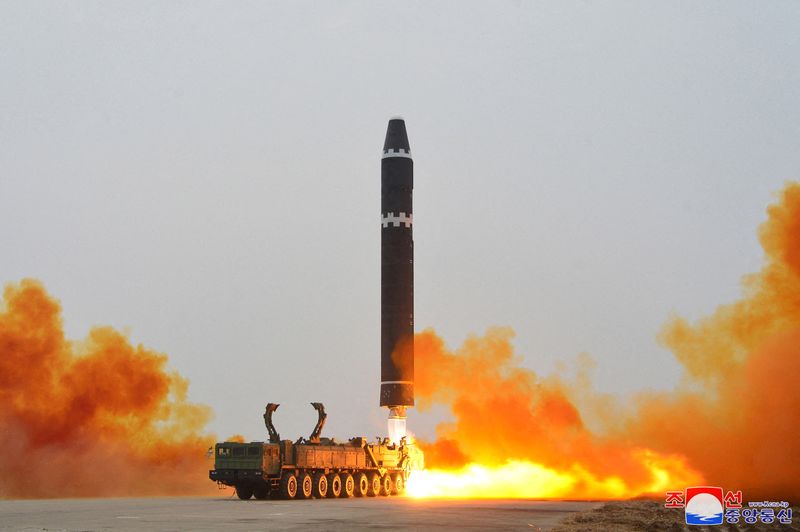By Hyonhee Shin
SEOUL (Reuters) -North Korea could test-fire intercontinental ballistic missiles on a lower, longer trajectory and conduct its seventh nuclear test this year to perfect its weapons capabilities, South Korean lawmakers said on Wednesday, citing intelligence officials.
North Korea has so far conducted ICBM tests only on lofted trajectories, but has already secured capabilities to launch them at a normal angle, enabling them to fly much further, the lawmakers said after a briefing by Seoul's National Intelligence Service (NIS).
The lawmakers said Pyongyang might undertake an ICBM test on a normal trajectory to pressure the United States, which has conducted military drills in the region recently and plans more large exercises in the coming months.
The briefing came as the U.S., South Korean and Japanese navies staged joint tactical drills on Wednesday in waters between the Asian neighbours.
A Japanese escort vessel and U.S. and South Korean destroyers joined the training aimed at stepping up trilateral ballistic missile responses, Tokyo's defence ministry said.
North Korea fired an ICBM on Saturday and two more short-range ballistic missiles on Monday, with the powerful sister of leader Kim Jong Un threatening to use the Pacific as a "firing range" depending on U.S. behaviour.
"ICBMs have not been launched at a normal angle so far, but North Korea has all the capabilities and seems to be preparing a timeline to boost the pressure effect on the United States," Yoo Sang-bum, a member of the parliamentary intelligence committee, told reporters after the briefing.
North Korea is also likely to carry out what would be its first nuclear test since 2017 and launch a spy satellite this year but it has yet to master the technology to equip multiple rocket launchers with atomic devices, Yoo said.
"There is a possibility for a seventh test which would be essential to complete the miniaturisation and lightening of weight of nuclear bombs," he said.
Youn Kun-young, another member of the committee, said North Korea might also develop solid fuel-based ICBMs this year, and confirmed the defence ministry's report that Chinese spy balloons did not enter South Korean airspace.
Also on Wednesday, North Korea's foreign ministry said UN Secretary-General Antonio Guterres has been "extremely unfair, unbalanced" on its missile tests.
Guterres condemned the North's latest ICBM launch, urging it to immediately halt further provocative actions, comply with Security Council resolutions banning such tests and return to denuclearisation talks.

He "should clearly understand that his unreasonable and prejudiced stand on the Korean peninsula issue is acting as a factor inciting the hostile acts of the U.S. and its followers," Kim Son Gyong, Pyongyang's vice foreign minister for international organisations, said in a statement carried by state media KCNA.
"In case a situation unwished by anyone arises on the Korean peninsula ... (Guterres) can never be free from the heavy responsibility for it."